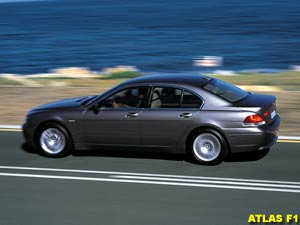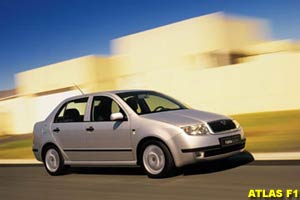

Automotive News and Reviews for the Petrolhead
Reuters Motoring Commentator
In this week's issue:
- Diesel Do
- Heated Debate Over Car of the Future
In all probability, you might not have considered the Skoda Fabia as an alternative to a BMW 7 Series, I know I hadn't. And yet they have so much in common, or at least the 730d and Fabia vRS do.
Both have six-speed gearboxes (automatic in the BMW, manual in the Skoda), air-conditioning, an in-dash CD player, on-board computer and a remote opening boot. Naturally, there are also a few differences too. I don't recall the BMW wing mirrors vibrating in time to The Kings of Leon at full volume, for example, but then is this not the price you (don't) pay for a car costing a quarter that of its big German rival? It matters not - ultimately it isn't the fixtures or fittings that bonds these two unlikeliest of bedfellows. The defining link is that both are powered by two of the very best diesel engines around.
Add Kudos to Credibility
I'm not sure I'm proud of it, but up until now I have always looked upon diesel as similar to charity work or DIY - a splendid idea, very worthwhile but ultimately something that other people do. A decent number of manufacturers have produced a decent number of very decent diesel-powered cars for many years, but so what? I've never wanted to queue behind an articulated lorry to fill-up. I didn't want a car that makes more noise than a Massey Ferguson. Even the dull but rational arguments in favour (improved fuel economy, greater resale values) seemed outweighed by the higher price of purchase or the fact that in rip-off Britain, diesel is more expensive at the pumps than unleaded petrol, while the rest of Europe can practically have it for free.
Variations on the Oil-Burnung Theme
The House of Skoda, meanwhile, has never quite been what you might call fashionable but, like all history, its old reputation for foisting four-wheeled frump on a disinterested world is a thing of the past. Today, Skoda is owned by the VW Group and boasts a model range that is both credible and, in some instances, downright desirable. The Fabia vRS is just such a car, Skoda having taken its established little hatchback and stuffed the front with a VW Group two litre, 130 BHP turbo-diesel engine. The marketing men have then cannily launched the vRS on the back of a new Fabia World Rally Championship contender, simultaneously promoting it as yet another rarity; a diesel hot-hatch.
So two variations on an oil-burning theme, each very different and yet similarly conceived; one a sumptuous luxury saloon, the other a more humble five-door hatchback, both with sporting aspirations and diesel engines under the bonnet. You may fill them up with the black-handled pump, but each is intended to stir the soul of the motoring enthusiast. But has it worked?
It's All Torque
Love it or loathe it for its looks, the BMW 7 Series is a formidable luxury saloon: capacious; comfortable; well-equipped, its handling and performance most definitely qualify as sporting, particularly for something this size. The straight six, three-litre diesel unit develops 218 BHP and in both the 3 Series and new 5 Series, it feels every cubic inch the performance engine. But in the 7, a genuine two-tonne Teuton, there was a chance it might prove a little too feeble.
Nothing could be further from the truth. The thing about diesel is that it is all torque (force multiplied by distance, in case you were wondering). Think of it in terms of changing a wheel on your car - it's easier to turn the spanner with the handle perfectly horizontal, isn't it? You are able to apply more force than if the spanner was vertical and diesel engine technology offers similar benefits. Torque represents usable power, immediately and at low revs, to propel a vehicle forwards and a diesel engine is more efficient than a petrol engine in this regard. The 730d, for example, generates 369lb of torque per foot, more than every petrol-engined model in the 7 Series range (with just the notable exception of the 760, an aircraft-carrier of a car with twice as many cylinders and double the cubic capacity). Not convinced? Well even the two litre, four cylinder vRS Skoda Fabia, with an output of 228lb/ft, is more powerful than the three litre, six cylinder petrol-engined BMW 730i!
Both cars are real driver's cars. The 730d's second-generation turbo-charged, common rail diesel engine is wonderfully flexible and incorporates new learning about fuel flow, pre- and post-injection and increased fuel system pressure, all of which is apparently why the car moves so quick, sounds so quiet and yet appears to never use any fuel. It is all too easy to forget that this is a sixteen-foot diesel limousine as you out-accelerate the boy racers (0-62 MPH in just 8.0 seconds) and hustle smoothly across tight roundabouts, glancing quizzically at the fuel gauge, bewildered as to why it appears never to move. And all the while, sat in the lap of utter luxury.
Good Set of Figures, Better Sense of Fun
Back in the real world, this translates into enough power to lend the Fabia a good enough set of figures (0-62 in 9.6 seconds, 127 MPH top speed) and an even better sense of fun. Because all that stump-pulling torque is available from as little as 1,900 RPM, the little Skoda is just perfect for battling across the back roads. And how rewarding it is to pull onto the forecourt, fill-up for under thirty quid and not have to do it again for almost 400 miles! The Fabia rides like a car twice its size and three times its price but still it can be yours for a very sensible £11,990. If there is a faster, more economical hatchback out there for the money, then I don't know what it is. In truth, I didn't even bother to check but that's because there's no need. Wing mirrors aside, the Fabia is rattle-free, well-equipped and easy on the eye, suitably adorned (alloys, discreet badging and deep front air dam) without being gauche.
Damn Good Cars
But we cannot ignore what it is that makes these two very different cars so similarly accomplished. Forget the difference in price or prestige; specification and size. What makes each of them so appealing is that they are damn good cars made all the more interesting because of their outstanding diesel engines.
So, having drawn the comparison in the first place, how would I suggest you choose between them? It's actually a decision nobody need make. Anyone with the budget and lifestyle for a 730 diesel BMW almost certainly has a need (and the spare cash) for two cars. So have them both! You'll get two great cars that are at least as good as, but cheaper to run than, their petrol counterparts and enjoy the smug satisfaction of feeling so well informed. What could be better? Every day, and in every way, you could pat yourself on the back for having made one of the best motoring decisions possible. Twice!
C After its biggest Japanese rival touted the economic and ecological benefits of hybrids, General Motors made a case of its own: only hydrogen-fuelled cars will survive in the endgame.
As the debate heats up over what the car of the future will ultimately look like, auto makers are staging a loud public relations battle to play up their strengths and justify the huge spending on developing the technologies so far. Just last Thursday, Japan's top auto maker, Toyota Motor, invited journalists to tour the production site of its new Prius hybrid to demonstrate how cheaply they could be built by sharing an assembly line with conventional mass-market cars.
But Larry Burns, GM's vice president of research, development and planning, said zero-emission fuel cell vehicles will eventually make gasoline-electric hybrids obsolete, rejecting Toyota's view that hybrids will remain on the road even after FCVs become affordable for the average consumer.
"The race needs to be judged with a long-term view -- the goal is to get automobiles out of the environmental debate altogether," he told Reuters in an interview.
Hybrids use electric motors and battery packs to improve fuel efficiency, adding power during acceleration and reclaiming energy when braking and coasting, but still need gasoline to run. GM has invested about $1 billion in developing fuel cells to power electric motors in vehicles, and wants to be the first auto maker to sell a million FCVs. It hopes to commercialise FCVs by 2010 -- one of the most optimistic targets in the industry.
Japan's Toyota and Honda Motor became the first to put a saleable FCV on the road last year, but the cars are only on lease since they still cost millions of dollars to produce. Despite the many hurdles that remain to make FCVs commercially viable -- such as a lack of infrastructure and safety standards -- Burns said weaning the industry off gasoline would become imperative as fledgling car markets like those in China and India continue to grow.
"If you look at the growth of economies in the world -- whether it be the U.S., Japan, Europe, or Brazil, Russia, India, China and Korea -- commensurate with that is the growth in energy consumption," he said.
And with many countries relying almost 100 percent on foreign oil, they would eventually want vehicles that don't run require any gasoline, he said. Still, the world's biggest auto maker stressed it will also offer other alternatives to conventional gasoline combustion engines in the interim before FCVs take over.
In a week-long presentation in Tokyo with its Japanese affiliates that started on Monday, the GM group will showcase other cutting-edge technology such as truck maker Isuzu Motors' clean diesel engines and Fuji Heavy Industries' research into next-generation car batteries. GM, which also has a capital alliance with minivehicle maker Suzuki Motor and South Korea's Daewoo Motor in Asia, plans to begin selling its first gas-electric hybrid cars next year.
![]() Diesel Do
Diesel Do
 The sensible lobby might also point to the taxable benefit of a diesel car for the top-end company car driver (boring) but, rather more importantly, diesel is actually now becoming rather sexy (that's better). Well, when the modish icons of motoring (e.g.: BMW) are embracing diesel like never before, you can immediately add kudos to the credibility. The BMW brand is founded on building the world's foremost sporting saloons, but its 730d is that rare thing indeed - a diesel-powered luxury saloon. The 7 Series' looks may not be to everyone's taste, but it remains an exquisitely well-engineered car, and is now available with the same jewel under the bonnet as the sensational 330d and new 530 diesel.
The sensible lobby might also point to the taxable benefit of a diesel car for the top-end company car driver (boring) but, rather more importantly, diesel is actually now becoming rather sexy (that's better). Well, when the modish icons of motoring (e.g.: BMW) are embracing diesel like never before, you can immediately add kudos to the credibility. The BMW brand is founded on building the world's foremost sporting saloons, but its 730d is that rare thing indeed - a diesel-powered luxury saloon. The 7 Series' looks may not be to everyone's taste, but it remains an exquisitely well-engineered car, and is now available with the same jewel under the bonnet as the sensational 330d and new 530 diesel.
 The engine in the Fabia vRS transforms Skoda's laudable, if less than arousing, Fabia hatchback into an utter hoot. I have read some motoring press reports of the Fabia that bemoan the fact that "it is no Peugeot 205 GTi". Well thank god for that, as the Peugeot went out of production during the last days of Tory government. Move out of your mum and dad's house, boys, and take your car posters with you. The term hot hatch is certainly an inaccurate description of the Fabia vRS, it's just that little bit down on power and a tad on the soft side to really qualify, but the car is no less impressive for it. The poor sap pining for the 205 has rather been taken-in by Skoda's marketing puff. The Fabia's Pumpe Duse engine, using clever injector technology and the most advanced injection system of its type for a turbo-diesel engine (according to Skoda), generates a healthy 130 BHP and that impressive 228lb/ft of torque.
The engine in the Fabia vRS transforms Skoda's laudable, if less than arousing, Fabia hatchback into an utter hoot. I have read some motoring press reports of the Fabia that bemoan the fact that "it is no Peugeot 205 GTi". Well thank god for that, as the Peugeot went out of production during the last days of Tory government. Move out of your mum and dad's house, boys, and take your car posters with you. The term hot hatch is certainly an inaccurate description of the Fabia vRS, it's just that little bit down on power and a tad on the soft side to really qualify, but the car is no less impressive for it. The poor sap pining for the 205 has rather been taken-in by Skoda's marketing puff. The Fabia's Pumpe Duse engine, using clever injector technology and the most advanced injection system of its type for a turbo-diesel engine (according to Skoda), generates a healthy 130 BHP and that impressive 228lb/ft of torque.
![]() Heated Debate Over Car of the Future
Heated Debate Over Car of the Future
© 2007 autosport.com . This service is provided under the Atlas F1 terms and conditions.
|
Volume 9, Issue 41
Atlas F1 Exclusive
Interview with Pizzonia
Fisichella: Through the Visor
Atlas F1 Special
Rear View Mirror Special
Half a World Away
GP Preview
2003 Japanese GP Preview
Japan Facts & Stats
Columns
The Fuel Stop
The JV Trivia Quiz
Bookworm Critique
On the Road
Elsewhere in Racing
> Homepage |